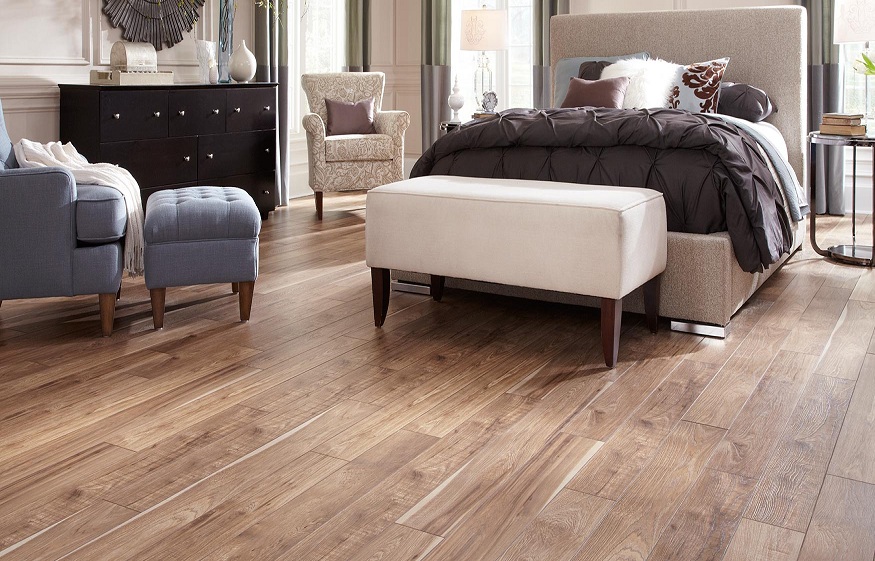Vinyl floors are a plastic coating made of PVC (Polyvinyl Chloride) with moisture-resistant mixtures, which makes them ideal for placing in kitchens, and bathrooms. As there are also vinyl models for floors that perfectly imitate wood or ceramic, they are also widely chosen as a finish for all rooms in the house.
Perhaps there may be the one that best suits your needs.
Types of vinyl floor
Within the “umbrella” of these plastic floors, there are three different varieties of vinyl floors, which have very different placements and features:
1. Vinyl Roll Flooring
Vinyl flooring roll comes as flexible sheets of Vinyl, around 2m wide, with thicknesses of 3mm. This means the floor can be laid with very few seams, as the generous widths minimize the number of joining joints. It is the most economical Vinyl flooring option and is usually self-adhesive or glued down with a water-based adhesive.
2. Vinyl Tile or Vinyl Tiles
Of the same thickness as roll vinyl floors, the only difference is that the tile is offered in smaller individual pieces. They are generally adhesive floors that come with a back protection film removed at the time of placement. It is the simplest vinyl flooring to install. If you are good at manual tasks, you can do them independently without major complications.
3. Vinyl Floors Click System or Luxury Vinyl
Click system vinyl is quite different material from roll vinyl. It is initially a thicker semi-rigid form of flooring (5 to 7 mm) manufactured in long planks to resemble wood or porcelain tile. It is also offered in the form of tiles, which resemble ceramic or stone tiles.
Of all the types of vinyl floors, it is the most suitable for high traffic, Ideal for commercial premises. Taking this circumstance into account, I would not hesitate to recommend them for use at home. Although you do not demand them as much as in public places, it is the one that gives you the most guarantees regarding premature wear.
These floors are made of an SPC core, a composite of stone and polyethene. On it, they have a decorative sheet and a layer of resistance to abrasion. The assembly has good rigidity and higher flexibility to install.
ADVANTAGES OF VINYL FLOOR
- Suitable for Renovations: Due to reduced thickness, they do not require cuts under openings. They can be applied over existing coatings or floors.
- Variety of colours: The current designs of vinyl floors differ from those of the 60s or 70s. Today they are offered with imitations of stones, ceramics and wood-like vinyl floors with great realism. PVC flooring is “comfortable underfoot” and less cold than the original materials, making them highly valued.
- Economic options: Self-adhesive vinyl flooring rolls (sheets and tiles) are very economical due to their price and simple installation. This makes them a very tempting alternative for limited budgets.
- Wear resistance: There are models (vinyl click system) with surface finishes (Extrem Protection) based on cross-linked polyurethane. Its resistance to wear and durability is up to SEVEN times greater than roll vinyl flooring.
- Impermeability: They have good resistance to humidity. That is why using Vinyl for Bathrooms and Kitchens or Children’sChildren’s Bedrooms is so common.
- Low Maintenance: Vinyl flooring is easy to maintain. All it takes is regular sweeping and mopping to keep it looking good every time.
- Easy and economical installation: It is not necessary to remove the previous floor to install a vinyl floor. Therefore, the work is done much faster, and no mess is required. All this directly affects the general price of the work, making the renovation of the floors of your house cheaper than in other cases.
DISADVANTAGES OF VINYL FLOORS
- Synthetic material: In the act of “brute sincerity”, we must recognize that it is not a ceramic material or a wooden floor. Despite this, it is an intermediate solution between a higher cost and an existing floor that you have already tired of.
- Not very ecological: They are plastic floors, and as such, they are made from a petroleum derivative. This may deduct points from an environmental perspective, as it comes from a non-renewable resource. However, not many may consider this type of assessment when buying vinyl flooring, but clarification is made.
- Difficult to remove if stuck: If your vinyl flooring is stuck down with water-based adhesives, it will be difficult to remove on your own without professional help.
- They are vulnerable to heat and sunlight: Vinyl flooring can deteriorate faster if exposed to direct sunlight or a direct heat source. That is why it is convenient that we do not leave hot objects on it. An extra fact: they can not be used outdoors.
- Limited resistance: Although the manufacturing processes for vinyl flooring have improved, they require more care than a conventional ceramic coating, for example. Sharp, rough or hot objects damage vinyl or PVC. In addition, it is always advisable to have fibre rugs at the entrance of the house. This way, it is possible to clean the footwear and avoid dragging dust and sand that increase the damage caused by friction.
- They do not camouflage the irregularities of the previous pavement: As we mentioned, the vinyl floor is usually installed on top of existing floors. This implies that if there are irregularities and unevenness in the base pavement, these can come to show through. But, of course, this will not happen with click system vinyl flooring.

